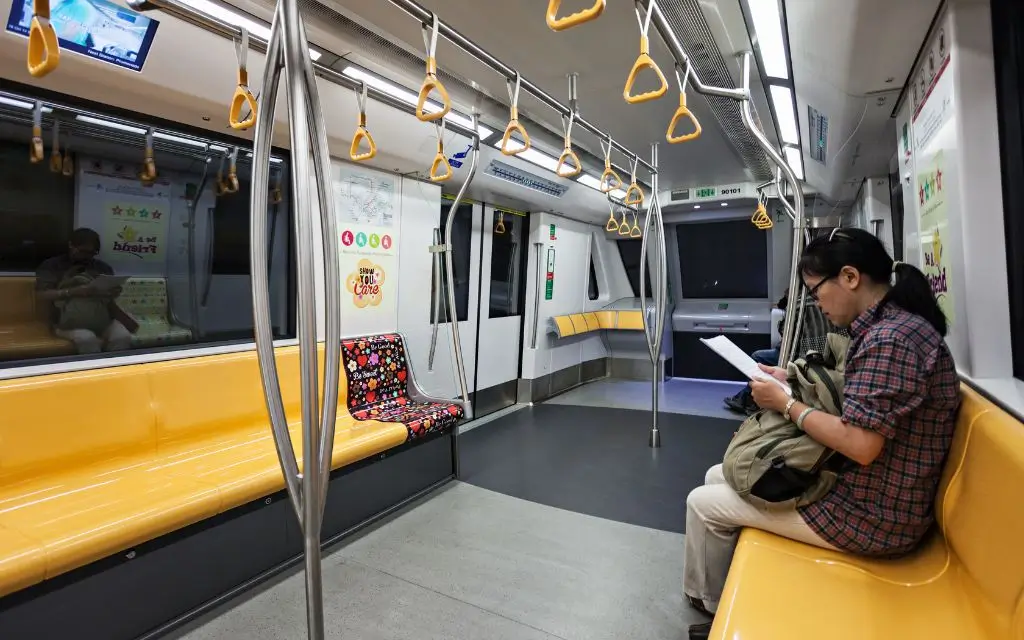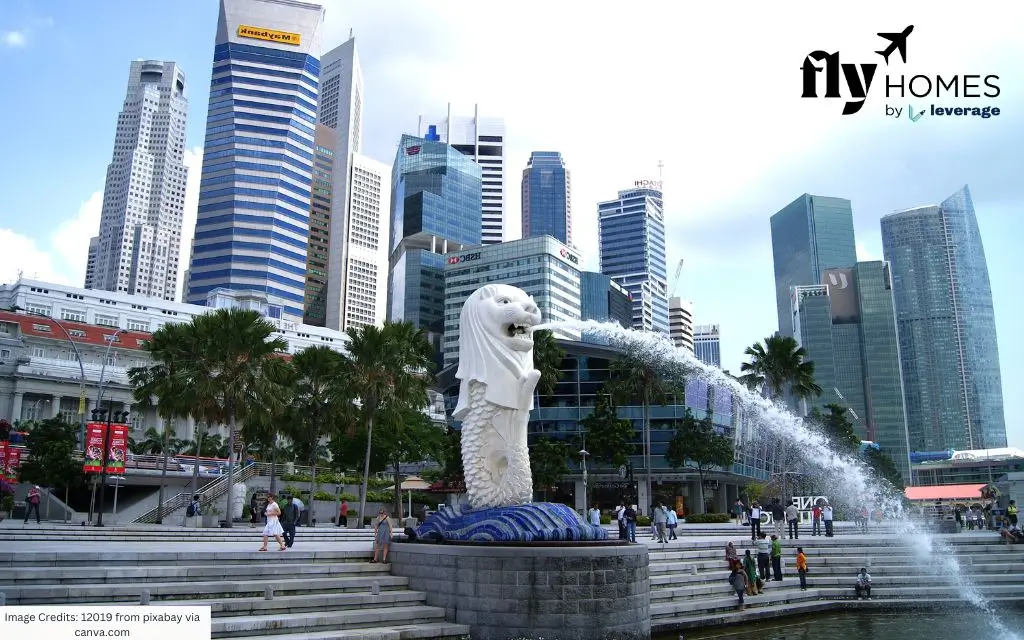Understanding the cost of living in Singapore is essential for individuals relocating to the island for higher studies. The differences in currency value can make managing expenses a bit challenging at first. However, by gaining a clear understanding of essential costs such as accommodation, food, transportation, and utilities, students can plan their budgets more effectively.
This blog will explore the various aspects of the cost of living in Singapore for an individual, enabling students to better prepare for life on the island and fully enjoy its vibrant culture without financial strain. Let’s dive in and take a closer look at the key expenses!
Table of contents
- Overview of the Cost of Living in Singapore
- Costs of Accommodation in Singapore
- Costs of Utilities in Singapore
- Costs of Dining in Singapore
- Costs of Groceries in Singapore
- Transportation Cost in Singapore
- Miscellaneous Costs in Singapore
- Cost of Studying in Singapore
- Cost of Healthcare & Insurance in Singapore
- Cost of Living in Singapore vs Others Regions
- How to Manage Cost of Living in Singapore for Students
- FAQS on Cost of Living in Singapore
Overview of the Cost of Living in Singapore
The cost of living in Singapore for an individual is around SGD 4,316 per month, covering essentials like food, rent, and other necessities, according to LivingCost data. This makes Singapore about 2.88 times more expensive than the global average. However, actual expenses can differ depending on factors such as where you live, your lifestyle choices, and personal spending habits.
Below, we provide an overview of the average monthly cost of living in Singapore for a student or a person, giving you a detailed insight into what to expect as you plan your budget.
| Expense Category | Average Monthly Cost |
| Cost of Living with Rent | SGD 4,316 |
| 1 bedroom Rent | SGD 2,591 to SGD 3,436 |
| Utilities | SGD 146 |
| Food | SGD 776 |
| Transport | SGD 366 |
Also Read:
Costs of Accommodation in Singapore
Singapore’s rental market is extensive but can be pricey for international students. Managing accommodation is essential, as it represents a significant portion of the overall cost of living in Singapore. The cost of housing varies widely based on factors like location, property type, and the amenities offered.

Here is a table that outlines the approximate accommodation costs students might encounter in Singapore.
| Accommodation Type | Size of apartment | Approx. Cost |
| 1 bedroom apartment in city center | 40 m² or 430 ft² | SGD 3,436 |
| Cheap 1 bedroom apartment | 40 m² or 430 ft² | SGD 2,591 |
Costs of Utilities in Singapore
Utility services in Singapore are essential amenities that contribute to the overall quality of life, supporting students in their daily activities. Utilities services there include electricity, water, gas, internet, and waste management.
It’s important to factor in these utility expenses when budgeting, as they can have a significant impact on your cost of living in Singapore. Below is a table outlining the approximate utility costs students may encounter in Singapore.
| Utility Type | Cost |
| Utility bill for one person (electricity, heating, water, etc.) | SGD 146 |
| Internet plan (50 Mbps+, 1-month unlimited) | SGD 49 |
Costs of Dining in Singapore
Singapore offers a diverse and vibrant culinary scene, with dining options that can cater to a range of budgets for students. However, the cost of eating out in Singapore can vary significantly depending on the type of restaurant, the cuisine, and its location.

For students, regular dining outside can have a notable impact on a student’s overall cost of living in Singapore. Here’s a rough estimate of what you can expect to pay for meals at different types of dining establishments in Singapore:
| Type of Restaurant | Approximate Cost of Meal |
| Lunch Menu | SGD 13.69 |
| Dinner for Two in a Restaurant | SGD 88.45 |
| Fast Food Meal (e.g., McDonald’s) | SGD 10.64 |
| Cappuccino | SGD 6.94 |
Costs of Groceries in Singapore
Students who enjoy cooking at home and prefer fresh food can purchase daily necessities and groceries to prepare meals. As a result, grocery expenses become a significant part of the cost of living in Singapore, as these costs can impact a student’s overall budget. Additionally, grocery expenses may vary based on individual dietary preferences and shopping habits.
To manage grocery costs effectively, it is recommended to compare prices across different supermarkets and local markets. Here’s a summary of typical grocery expenses for those who plan to cook at home:
| Item | Approx Price |
| Milk (1 L) | SGD 4.02 |
| Bread (0.5 kg) | SGD 3.24 |
| Rice (1 kg) | SGD 3.91 |
| Eggs (12) | SGD 5.09 |
| Cheese (1 kg) | SGD 28.42 |
| Apples (1 kg) | SGD 5.83 |
| Bananas (1 kg) | SGD 4.28 |
| Oranges (1 kg) | SGD 5.57 |
| Tomatoes (1 kg) | SGD 3.58 |
| Potatoes (1 kg) | SGD 3.66 |
| Onions (1 kg) | SGD 3.29 |
| Water (1 L) | SGD 1.31 |
Transportation Cost in Singapore
Navigating Singapore is simple and convenient, thanks to its efficient public transportation system. Most residents and students prefer using public transport because of its reliability and ease. For students, transportation expenses become a regular part of their daily routine, especially when commuting to and from college.

Opting for public transportation is also a smart way to manage the overall cost of living in Singapore for students, as it is more affordable than owning and maintaining a private car. Below is a breakdown of typical transportation costs in Singapore to help you plan your travel expenses effectively:
| Transportation in Singapore | Average Cost |
| Local transport ticket | SGD 2.08 |
| Monthly transport ticket | SGD 112.88 |
| Taxi ride (8 km) | SGD 23.68 |
| Gas/petrol (1 L) | SGD 3.05 |
Also Read:
Miscellaneous Costs in Singapore
In addition to major expenses such as food, rent, and transportation, miscellaneous costs also play a role in the overall cost of living in Singapore for students. Although these expenses are often smaller and overlooked, they can add up over time.
It’s important to factor miscellaneous costs into your budget to ensure a more accurate financial plan. Below is a table providing an overview of common miscellaneous costs in Singapore.
| Miscellaneous | Approx Cost |
| Movie Ticket | SGD 16.14 |
| Fitness Club | SGD 153 |
| Brand Jeans | SGD 76 |
| Brand Sneakers | SGD 106 |
| Doctor’s visit | SGD 72.90 |
Cost of Studying in Singapore
For international students, understanding the tuition fees of Singaporean universities is essential for effectively managing the cost of living in Singapore, as education expenses can greatly affect their overall budget. Tuition fees in Singapore differ significantly based on the university, the chosen program, and the level of study.
Below is an overview of the estimated tuition fees for top universities and colleges in Singapore:
| University/College Name | 1st Year Tuition Fees |
| National University of Singapore | SGD 17,330 – SGD 170,000 |
| Nanyang Technological University | SGD 17,800 – SGD 87,710 |
| Singapore Management University | SGD 21,600 – SGD 358,000 |
| James Cook University in Singapore | SGD 21,330 – SGD 40,180 |
| Singapore University of Technology and Design | SGD 29,900 – SGD 62,080 |
| Singapore Institute of Technology | SGD 24,520 – SGD 38,500 |
| LASALLE College of the Arts | SGD 18,000 – SGD 31,500 |
| Management Development Institute of Singapore | SGD 5,120 – SGD 50,220 |
| Duke-NUS Graduate Medical School | SGD 56,300 |
| Ngee Ann Polytechnic | SGD 8,350 – SGD 26,920 |
| INSEAD – Singapore | SGD 51,110 – SGD 205,000 |
| Singapore Institute of Management | SGD 9,200 – SGD 38,750 |
| Singapore Polytechnic | SGD 12,000 – SGD 26,920 |
| Nanyang Polytechnic | SGD 12,140 |
| SIM University | SGD 6,420 – SGD 54,940 |
| University of Nevada, Las Vegas Singapore | SGD 24,600 |
| FTMSGlobal Academy | SGD 15,000 – SGD 26,000 |
These tuition fees provide an estimate of the cost of higher education in Singapore, helping students prepare financially for their studies in the country.
Cost of Healthcare & Insurance in Singapore
Healthcare in Singapore is highly regarded for its quality, and residents benefit from a robust healthcare system. Those with permanent residency may qualify for state-supported health insurance, which helps reduce some medical expenses. However, considering the high cost of living in Singapore, it is recommended to obtain private health insurance for more comprehensive coverage and to safeguard against unforeseen health costs.
For example, a basic medical checkup may cost approximately SGD 71.24. In addition, residents can access health cards and benefit plans to manage their healthcare expenses more effectively.
| Healthcare & Insurance Plan | Details |
| Health Card | Apply at your local City Office or Residential Affairs Division at the Ward Office. Premiums are based on age and previous year’s earnings. |
| Essential Benefits Plan (EBP) | Available for low-wage workers and unemployed individuals. It provides basic health insurance coverage at an affordable price for essential services. |
| Medical Checkup Cost | Approximately SGD 71.24 for a basic checkup. |
Cost of Living in Singapore vs Others Regions
The cost of living in Singapore for an individual can vary, being higher or lower compared to other regions, depending on factors such as housing, transportation, and lifestyle choices. Generally, Singapore is known for its high living expenses, ranking among the most expensive cities globally.
Let’s now take a closer look at how the cost of living in Singapore compares with other regions:
- The comparison of the cost of living in Singapore vs India shows that the cost of living in India is significantly lower, with monthly expenses averaging around SGD 600, compared to Singapore’s higher costs.
- The comparison of the cost of living in Singapore vs Dubai shows that the cost of living in Dubai is approximately SGD 3,150, which is lower than in Singapore.
- The comparison of the cost of living in Singapore vs the United States shows that the cost of living in the United States averages around SGD 3,348, which is slightly lower than in Singapore.
- The comparison of the cost of living in Singapore vs Malaysia shows that the cost of living in Malaysia is significantly lower, with average monthly expenses around SGD 937.
- The comparison of the cost of living in Singapore vs Hong Kong shows that the cost of living in Hong Kong is approximately SGD 3,756, slightly lower than in Singapore.
- The comparison of the cost of living in Singapore vs Australia shows that the cost of living in Australia averages around SGD 3,224, which is lower than in Singapore.
- The comparison of the cost of living in Singapore vs London shows that the cost of living in London is around SGD 4,676, which is higher than in Singapore.
- The comparison of the cost of living in Singapore vs Canada shows that the cost of living in Canada is approximately SGD 2,832, lower than in Singapore.
- The comparison of the cost of living in Singapore vs France shows that the cost of living in France is about SGD 2,204, which is lower than in Singapore.
- The comparison of the cost of living in Singapore vs the United Kingdom shows that the cost of living in the United Kingdom averages around SGD 2,923, lower than in Singapore.
- The comparison of the cost of living in Singapore vs Japan shows that the cost of living in Japan is around SGD 1,473, much lower than in Singapore.
- The comparison of the cost of living in Singapore vs New York shows that the cost of living in New York is approximately SGD 3,294, higher than in Singapore, particularly for housing and daily living expenses.
- The comparison of the cost of living in Singapore vs Germany shows that the cost of living in Germany is around SGD 1,671, lower than in Singapore, especially regarding housing and daily expenses.
- The comparison of the cost of living in Singapore vs Europe shows that the cost of living in many parts of Europe is lower than in Singapore, though cities like Zurich or Paris may have similar costs.
How to Manage Cost of Living in Singapore for Students
For students, managing the cost of living in Singapore requires careful planning and budgeting, as the city is known for its high living expenses. Effectively understanding and controlling your expenses is crucial to maintaining financial stability while living in this vibrant city. Here are some practical tips to help you manage the cost of living in Singapore:
- Create a Student Budget: Start by tracking your expenses and part time income. Break down costs into categories like rent, food, and transport to gain a clear picture of your spending, helping you manage the cost of living in Singapore effectively.
- Affordable Accommodation: Housing is one of the largest expenses. Opt for university dorms, shared flats, or HDB flats instead of private apartments to reduce accommodation costs.
- Use Public Transport: Singapore’s public transport is efficient and affordable. Students should avoid owning a car and make use of discounts or monthly passes for the MRT, buses, and other public transport options to keep commuting costs low.
- Cook at Home: Avoid dining out regularly and cook your meals instead. Shopping at local markets and cooking at home can significantly lower food expenses, helping to manage the cost of living in Singapore.
- Student Discounts: Take advantage of student discounts available at restaurants, shops, and on transportation. Always carry your student ID and look for deals to save money.
- Free or Low-Cost Activities: Enjoy the many free or low-cost activities in Singapore, such as exploring parks, beaches, and museums. Engaging in university-run events or student clubs is another great way to socialize without additional costs.
- Health Insurance: Make sure you have health insurance, either through your university or a private plan. This can help avoid expensive medical bills and manage healthcare costs effectively.
By following these tips, you can effectively manage your cost of living in Singapore and maintain a comfortable lifestyle while keeping your finances in check. For booking the best student accommodation abroad to start your study abroad experience you can contact Fly Homes at 1800572118.
Also Read:
FAQS on Cost of Living in Singapore
The average cost of living in Singapore for an individual is approximately SGD 4,316 per month, which covers essentials such as food, rent, and utilities. However, costs can vary based on personal lifestyle, location, and spending habits.
The average living cost for international students in Singapore is around SGD 4,316, which is around 2.88 times more expensive than the global average. Because of this, Singapore offers an excellent lifestyle, particularly for students.
To live comfortably in Singapore, a student would need about SGD 4,316 per month, including rent, food and other essential things. This figure represents the general cost of living in Singapore for an individual in the region.
Singapore is generally considered to be an expensive place to live in for students because the average cost of living for a single person is around SGD 4,316 per month (including rent), which is higher than the global average.
Rent in Singapore can range from SGD 2,591 to SGD 3,436 for a 1-bedroom apartment, depending on the location. Living in the city center generally costs more than staying in the outskirts, which impacts the overall cost of living in Singapore.
The average utility costs, including electricity, water, gas, and waste management, are around SGD 146 per month. Internet services cost an additional SGD 49 for a 50 Mbps+ connection, contributing to the total cost of living in Singapore.
The average monthly cost for food in Singapore is around SGD 776. This can vary depending on whether you dine out frequently or prefer cooking at home, which influences the cost of living in Singapore for students.
Public transportation is the most cost-effective option in Singapore, with local transport tickets costing approximately SGD 2.08. A monthly pass for local transport is around SGD 112.88, while taxi rides cost about SGD 23.68 for an 8 km trip, helping to keep the cost of living in Singapore manageable.
Grocery costs in Singapore can vary depending on the items you purchase. For example, milk (1L) costs about SGD 4.02, while bread (0.5kg) costs SGD 3.24. Fresh produce like apples (1kg) costs SGD 5.83, and rice (1kg) costs SGD 3.91, which makes groceries a significant part of the cost of living in Singapore.
Dining out in Singapore varies based on the restaurant. A lunch menu typically costs around SGD 13.69, while dinner for two can cost approximately SGD 88.45. A fast-food meal costs around SGD 10.64, which should be factored into the overall cost of living in Singapore.
Miscellaneous expenses such as movie tickets (SGD 16.14), fitness club membership (SGD 153), and doctor’s visits (SGD 72.90) should be considered in your monthly budget when evaluating the cost of living in Singapore.
Tuition fees for international students vary greatly by university and program. For example, National University of Singapore charges between SGD 17,330 and SGD 170,000, depending on the program, which is a significant factor in the cost of living in Singapore for students.
Follow Us on Social Media




























